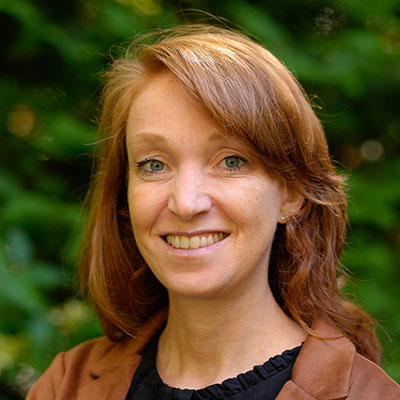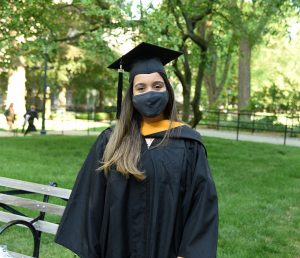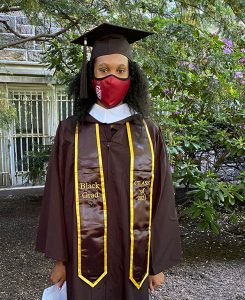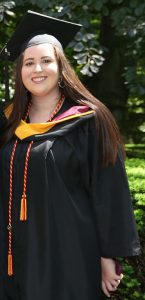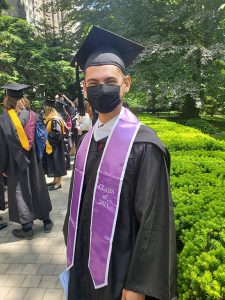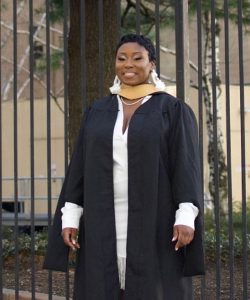For over 25 years, Fordham has given them the skills they need to do that work safely and effectively.
Through the Institute of International Humanitarian Affairs (IIHA), Fordham offers the International Diploma in Humanitarian Assistance (IDHA), a unique training program for humanitarian workers from all over the world.
The four-week residential immersion course is designed to train and develop those working for humanitarian aid organizations who are looking to advance their careers.
The Trainings
The 59th IIHA training session, which finished last month, took place in Amman, Jordan. The next one is scheduled for May 4 to 30 in Pretoria, South Africa. Trainings are now mainly offered in the Global South as part of an effort to empower aid workers who are closer to communities affected by war, famine, and natural disasters.
The goal of the training is to help students develop a holistic understanding of global humanitarian issues, as well as on-the-ground skills. That means learning about “big picture” aspects of the field, such as international humanitarian law and The Grand Bargain, a 2016 agreement between donors and humanitarian organizations. It also means learning and studying the fields of shelter and camp management and human trafficking, particularly during a humanitarian crisis.
Staying Safe in Dangerous Times
Martine van der Does, the IIHA’s newly appointed Helen Hamlyn Humanitarian Fellow & Global Program Director, said that it is a sad reality that the training has become even more important as the field has become more complex and dangerous in the last few years.
Van der Does, who oversees the IDHA, noted that last year, the United Nations reported that a record 281 aid workers were killed, of which 96% were local staff.
“Humanitarian aid has become more complex, and there is far less respect for international humanitarian law and humanitarian principles,” she said.
To that end, one full day of the program is devoted to key trends and threats to humanitarian workers, trauma first aid basics, personal health, and mental and physical resilience in humanitarian settings.
New Leadership
Van der Does, a former diplomat and regional humanitarian coordinator for the Netherlands government, is an IDHA alum, having completed the training in 2008. She earned a master’s in international humanitarian action from Fordham in 2017 and served as a tutor and course director for five recent IDHA training sessions.
“I always said if I could make a full-time job out of this, it would be my dream job,” she said.
The seamless bridge between fieldwork and academic theories taught in the classroom is a hallmark of the IDHA, and the reason Van der Does said she’s excited to have returned to lead the training.
“Because of our network and our alumni database, we are able to bring in front-line aid workers complementing theory with the most recent realities on the ground,” she said, citing Gaza as an example.
Graduates Hail from Many Countries, Work in Myriad International Organizations
After graduating from the IDHA program, Van der Does joined Doctors Without Borders. She was sent to Niger, where she coordinated the construction of health centers and hospitals. Her experience was similar to other IDHA graduates, who have gone on to work in administrative and field positions at organizations such as UNICEF, Save the Children, International Committee of the Red Cross, and Jesuit Refugee Corps.
She said she thrived in part because of the experience she gained from working on IDHA assignments with classmates hailing from Iraq, Belgium, Italy, the U.S., and Sudan.
“One of my fondest memories from that time in Niger is the long days I spent traveling on hot, sandy roads to the various health centers we were working in,” she said.
“I sat in the front of a pickup truck with AS, who was my driver, and Ali, who was my construction assistant, discussing culture and politics while a desert landscape with camels and bedouins passed our window views. It was a perfect way to learn about the context I was working while also building unforgettable friendships.”
]]>McGoldrick, a lecturer, author, and expert in international law, the Middle East peace process, and humanitarian aid, previously held the position of deputy special coordinator, resident coordinator, and humanitarian coordinator in UNSCO, from 2018 to 2020, when he was replaced by Lynn Hastings.
Hastings stepped down in early December, and McGoldrick was asked to oversee relief efforts in Gaza and the West Bank until a permanent replacement can be found.
McGoldrick said that previous experience gives him a good sense of who he’ll have to work with to successfully deliver aid to the region. The Oct. 7 attack by Hamas on Israel, and the resulting war that has raged in Gaza since then, has radically changed the reality on the ground, but the major players are in many ways the same, he noted.
“It will be a challenge taking on a job like this, but I know the context, and I think I can work in that context, especially with the national and international staff in place,” he said.
“I believe that if there’s goodwill with all the people that you work with, then you can optimize what you’re trying to do. And I hope to work with all the different constituencies to try and get them to be receptive towards the humanitarian endeavor.”
A Focus on Current Needs
McGoldrick said he’s focused on getting aid to the residents of Gaza as soon as possible. A U.N. report issued on Dec. 21 laid out how dire the stakes currently are there, noting that half of residents there are on the verge of starvation.
“When you get a crisis or a disaster of this kind, you have to plan for prioritization and quick expansive response in order to try and save lives and protect people,” he said.
In April 2020, McGoldrick reflected on the challenges of working in the region, in the fifth installment of the Ireland at Fordham Humanitarian Lecture Series. At the time, he noted how excruciatingly difficult it is to separate politics from relief work in the region, but how it’s absolutely paramount. That’s still true today.
“No matter what happens at the end of this conflict, there will be community structures, groups and leaders, and authorities who will want to work with the people,” he said.
“We just have to try and find out how we can locate those and use them to try and mobilize.”
Sharing Insights with Students
As an instructor in the IIHA’s International Diploma in Humanitarian Assistance program, McGoldrick will share his insights with students at Fordham when he finishes his current assignment. He currently does so via the podcast Humanitarian Fault Lines.
“There’s a lot of theory and policy that people should understand, but I think people learn more from case studies and stories,” he said.
“If you tell somebody a story about an individual who was in a crisis or a conflict, and how their life was affected, and then changed and improved, people remember that more.”
Ultimately, he said, a humanitarian aid worker is only successful if a level of trust exists among people on all sides of a conflict.
“That is where it makes a difference because somebody might not agree with what you do immediately, but you can get them to understand why you’re doing it,” he said.
“I think that’s the approach that you have to adopt. Otherwise, it’s just sides rubbing against each other, and that doesn’t help anyone.”
]]>Beyond the death toll, millions of people have been injured and displaced. The United Nations said that the earthquake had affected as many as 5.3 million in Syria alone. And for Turkey, the situation is all too familiar: Turkey sits atop two major fault lines and has suffered major earthquakes before. In 1999, a 7.6 magnitude earthquake was blamed for an estimated 18,000 deaths.
Complicating the current crisis is the fact that the area of Northern Syria impacted by the earthquake has been riven by violence for the past decade due to the county’s ongoing civil war. The war, which grew out of the wider Arab Spring protests of 2011, has left northern sections of the country in the hands of rebels opposed to Bashar al-Assad, the country’s leader.
To shed light on the complexities of this ongoing catastrophe, Fordham News spoke with experts in international humanitarian aid, the Middle East, and mental health.
Politics and Aid
Anjali Dayal, Ph.D., associate professor of political science and a senior scholar in residence at the United States Institute of Peace in Washington, D.C.
The aid situation in Syria is deeply dependent on United Nations Security Council politics because the region in Syria that was hardest hit has been part of complex international negotiations about the passage of aid. The U.N. is an intergovernmental organization, and under the terms of the U.N. Charter, the Syrian government has ultimate authority over the area–but the northwest part of the country remains locked in an ongoing civil war, where the Syrian government’s authority is contested on the ground. The politics of U.N. aid passing into this part of Syria have become really complicated, as a result.
Over the years, the negotiations in the Security Council, where Russia has veto power, narrowed down the number of open crossings to a single one in northwest Syria, Bab al-Hawa, which was badly hit by this earthquake.
Thankfully, after a closed-door U.N. Security Council meeting on Monday, U.N. Secretary-General Antonio Guterres announced that the Syrian government has agreed to allow two more border crossings between Syria and Turkey to open up for three months [to allow for] humanitarian relief to the earthquake-struck zones.
This is important because it means that the international community [including the U.N.] can get aid to a part of Syria [run by the anti-al-Assad rebels] where the Syrian government is more than happy to let people die. There are local organizations on the ground that cross through other crossings, but nobody really has the scale or reach that the U.N. does for the volume of aid that’s necessary at this moment in particular. That’s why this has become so contentious.
So a huge crisis like this really highlights how important it is to have concerted multilateral abilities to respond right away in the service of people who really need the best assistance that they can get.
Consequences of Corruption and Civil War
Melissa Labonte, Ph.D., associate professor of political science and a faculty affiliate of Fordham’s Institute of International Humanitarian Affairs
I would describe this as sort of a tale of two humanitarian crisis responses. In Turkey, you have a capable state, but it’s a state that is sclerotic and has been plagued by corruption. Anyone who has traveled to Turkey in the last few years has seen huge construction projects that have been doled out as political favors to loyalists of president Recep Tayyip Erdoğan’s AKP party. You have buildings that have not been built to code, in areas that are very close to the fault lines. This was a recipe for disaster.
The other is Syria, where prior decisions stemming from the Civil War mean that in an area with about 11 million people in it, more than half are internally displaced persons from other parts of Syria.
Most people understand that the Syrian Civil Defense Force, or “white helmets,” have been working in this area for a really long time with very little assistance from the outside world.
You’ve got millions of people who are now living in structures that were decimated by the war. They have no food, no shelter, no medicine, and no water. It’s that last element that is going to turn that part of the post-earthquake crisis into one where the death toll is going to start to mount catastrophically. Because what’s going to happen next is there’ll be a massive outbreak of cholera.
As an international community, we have to come to the recognition that things are so deeply interconnected. Our failure to deal with crises like Syria and our failure to cultivate a more responsive democracy in Turkey are the antecedent conditions that lead to the inability or the unwillingness of regimes to respond effectively to their populations.
‘Recovery Will Take Time’: The Importance of Ongoing Donations
Selin Gülgöz, Ph.D., assistant professor of psychology who lived in Istanbul from 1993 until 2009, when she moved to the United States for graduate school. Her family still lives there today.
Istanbul wasn’t affected directly by this earthquake, but we did live through the major earthquake back in 1999, where the epicenter was a little bit outside of the city. I was very fortunate at that time that our family was unaffected, but it’s hard to remain unaffected even if your close ones are not hurt. I was 11 at the time, so it was quite traumatizing.
It’s estimated that this earthquake has impacted roughly 15 million people. Turkey as a whole country has about 80 million. So that’s a huge percentage of the population.
Most of my efforts so far have been trying to raise awareness of some of the local organizations that have been there from day one, and are often faster than governmental organizations.
There are two that have a proven record of trust and professionalism, are reliable, fast-acting, and have networks in Turkey on the ground: Turkish Philanthropy’s Turkish Earthquake Relief Effort; and Bridge to Turkiye’s Earthquake Relief Fund.
Right now, 30,000 people have died and the number is expected to rise. Even more have been displaced, including children who have lost their families, so monthly contributions are encouraged, as healing and recovery will take time.
An Event That Affects the Whole Region
Samantha Slattery, FCRH ’15, GSAS ’19, Regional Programmes Officer for Jesuit Refugee Service in Beiruit, Lebanon. Slattery earned an M.S. in humanitarian studies at Fordham.
I work with projects addressing the crisis in Lebanon, which has the highest refugee population per capita in the world. Our office supports JRS teams in Syria in Aleppo and Homs, and right now they’re helping with emergency distributions, especially winterization materials because it’s very cold here right now. Anyone who wants to help our teams can do so by donating here.
The difficulty that all organizations are experiencing right now in Syria is that a lot of aid workers and volunteers there have also already experienced multiple traumas from the war. Now they’ve survived this earthquake, and many have suffered their own personal losses.
In Lebanon, the earthquake woke us up from our sleep here, and luckily, it missed us. But people are still affected here. So many of the people we work with have lost loved ones in Aleppo. It affects the whole region.
A concern that I have is that international attention could wane. Right now there’s a big effort from the international community to respond to these crises, but once crises become protracted, the eyes of the world look away to new emergencies.
Focusing on Mental Health
Lynne Jones, child psychiatrist and course director for the program on Mental Health in Complex Emergencies at Fordham’s Institute of International Humanitarian Affairs
I hope that this will shake people into their senses and realize that human beings are human beings, and they need their basic needs addressed. I would add to that list the emotional need for connection. Whether somebody has died or not died, everybody has experienced loss. If it’s compounded by the loss of a loved person, of course, it’s much worse, but even if you haven’t lost a person, you’ve lost the environment in which you’ve lived. You’ve lost any sense of security, you’ve lost all your belongings.
Imagine you’re standing there and everything around you has been destroyed. What you need is to be reconnected with people that are familiar to you and reestablish as quickly as possible some kind of structure and routine in your life. And, these two things will really help you address the other issues of maintaining your physical health.
I’ve written guidelines with others for both the COVID pandemic and the Ukraine crisis on how we can support children who have suffered a bereavement. We’re adapting them now. The key points are, to tell the truth in a way that’s appropriate to a child’s developmental age and to make sure that they have continuous loving care.
]]>Originally from Shire, Ethiopia, Ibrahim grew up in Queens, New York. Throughout her childhood, she returned to Ethiopia to visit relatives. According to her family, it was the disparities between her life in New York and those in her homeland that lit within her a passion for social justice and humanitarianism.
Ibrahim earned a Bachelor of Arts in Political Science and History from Pace University, with a double minor in Peace and Justice Studies and Critical Race and Ethnicity Studies. In 2020, she enrolled in the MS in Humanitarian Studies program at Fordham’s Graduate School of Arts and Sciences. She was preparing to graduate in August and was applying for doctoral programs with the hope of working for an international NGO and eventually launching an education-focused nonprofit in Ethiopia. The University recently announced that it will grant Zuher’s degree posthumously.
According to her friends and advisers, Ibrahim was a brilliant and charismatic student who juggled a full academic workload and a full-time job as a risk analyst at the law firm Cleary Gottlieb Steen and Hamilton LLP, where she had been employed since 2018. She also devoted time to fighting against injustices and encouraging others to become engaged in policy reform in a podcast she co-hosted called “Just Too Opinionated.”
“Zuher was a tireless and respected advocate for peace,” said Joseph M. McShane, S.J., president of Fordham University.
“For the last two years, she had dedicated herself to advocacy work around Ethiopia’s Tigray region, where the nation’s civil war has brought widespread suffering and left thousands dead. We can all be proud that a member of our University community was striving to help others in a place where courageous humanitarian effort is so very necessary.”
Ibrahim, who had been living in Queens, New York, was a fierce advocate for many other causes that were important to her. According to her LinkedIn profile, she advocated for students of color at the Vera Institute of Justice, campaigned for social change as a program organizer at DoSomething.org, and strived to increase awareness of assault and rape as a communications associate at #PaceUEndRape, among other advocacy roles.
“What struck me the most about her is just how committed she was to political activism and to fighting injustice,” said Ibrahim’s adviser and instructor, Laura Perez, the Helen Hamlyn Senior Fellow, and director of graduate studies at Fordham’s Institute of Humanitarian Affairs (IIHA).
“She was absolutely 24/7 involved in the advocacy work around Tigray in Ethiopia, and she brought that kind of activism to everything she did. For her, the fight against injustice was at the forefront of her mind and really informed everything that she did. That was the purpose of her life.”
In a 2020 interview on the IIHA website, Ibrahim reflected on what inspired her, and cited the words of Martin Luther King Jr.: “Life’s most persistent and urgent question is, ‘What are you doing for others?’”
“The grave differences of inequities present in the world made me question why [I should] have more access to education, clean water, and economic mobility solely because of where I live,” Zuher said.
“What gets me out of bed each morning is knowing that I have the chance to make the world a better place.”
Nana Osei-Opare, Ph.D., an assistant professor of history who was Ibrahim’s thesis adviser, commended her “extreme commitment” to the causes she believed in.
“She was a young woman with a whole life ahead of her,” he said.
“It’s such a sad shame that someone with her passion is no longer with us.”
Ibrahim is survived by her brother, Fahme Ibrahim; her mother, Aziza; her father, Ali; and her grandparents, aunts, uncles, and friends. In conformity with Muslim tradition, she was laid to rest on Wednesday, April 27. A fundraiser has been organized for her funeral and other related expenses.
—Claire Curry
]]>One of the people those refugees are encountering as they cross into Moldova, a tiny neighbor to the west, is Joseph Lowry. Lowry, a native of Dublin who lives in Vienna, Austria, is a senior communications/media officer and spokesperson for the International Organization for Migration (IOM), which is overseen by the United Nations. In 2004, he earned an International Diploma in Humanitarian Assistance (IDHA) from the Institute of International Humanitarian Affairs.
Heading to the Ukraine Border
Lowry left Vienna on March 3 and arrived three days later at Moldova’s Palanca border crossing, near the Ukrainian port city of Odesa. He only had a brief chance to observe the scene there before he tested positive for COVID-19 and had to isolate in a hotel in the capital of Chișinău. But the visit still made clear the gravity of the situation.
“It so impossibly gargantuan, it’s hard to wrap your head around,” he said in a phone interview on March 8. Over 275,000 people had crossed this border at that point, he said. Some were arriving in packed S.U.V.’s; others only had that they could carry in suitcases. What was most heartbreaking was watching men say goodbye to their wives, mothers, sisters, and children.
“The men were turning around and walking back towards Ukraine with their shoulders up. Many of them were going back to fight, and they were proud, their chests were out. They were defiant, but obviously, they were heartbroken as well,” he said.
“The kids, you could see, didn’t realize what was happening, that daddy wasn’t going [into Moldova]yet, but they were. As a father, that for me was something I could identify with.”
Most of the refugees are passing through Moldova on their way to Romania and other European countries to the west, but they need a place to recharge, and in Chișinău, that has meant opening the Moldexpo, a small exhibition center that has served for the past two years as a COVID-19 treatment center. On March 8, it was housing 1,000 people, nearly double its intended capacity.
Telling the Story on the Ground
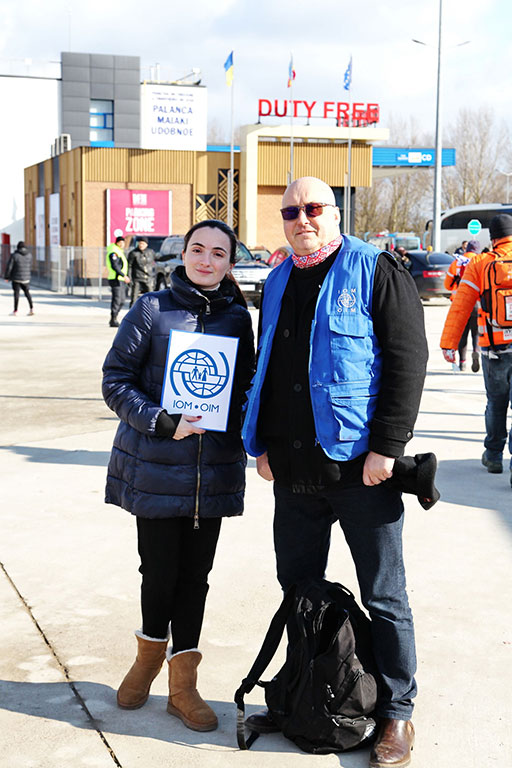
For Lowry and a small staff that traveled to Chișinău from Vienna, the job is to tell the story of not only the refugees through his Twitter account and his blog, but of the staff based in Moldova, who are supervising tasks like the procuring of scanners that can quickly read the documents of people waiting to cross the border.
In some ways, this humanitarian crisis is familiar to Lowry, who has been working in the field since 1993 and has been dispatched after natural disasters to places such as Myanmar and Somalia. At the same time, the magnitude here is much worse, he said.
Working in the media, for instance, he said he’s accustomed to a weeklong window after an emergency where the media lets them tell their story before questions about supply bottlenecks become sharper. But he doesn’t expect that now.
“My sense is that won’t happen this time because this is just unlike anything else. The media can see from where they are that it’s not going to be easy to get humanitarian aid to where it needs to get to because there’s still a war going on,” he said.
When it comes to helping, Lowry said that it’s natural that people might want to donate goods, but the answer, he said, is cash, cash, and more cash.
“We can buy in bulk locally, so we’re supporting the local market. We can get stuff across borders because we have arrangements with the border authorities. We can move things into where they’re needed,” he said.
The Most Difficult Challenge
Larry Hollingworth, the director of the IDHA, said the trainings, which have taken place for 20 years at Fordham, as well as in Africa, Asia, the Far East, and Latin America, are inexorably intertwined with day-to-day operations such as Lowry’s. While every call to action differs by the cause of the crisis, access, climate, geography, the physical and mental state of the population, and resources available, he said war is the most difficult challenge.
“Humanitarian aid workers pride themselves on a response which is neutral, impartial, and independent. We try not to take sides. In many crises, this is very hard, because there is an oppressor and an oppressed. Such is the case in Ukraine today. We have resources, we have the expertise, we have the humanitarian imperative to respond, but we have very limited access,” he said, noting this the war has quickly morphed from a regional crisis to a global one.
“There is so much more we could do if the population had egress. This is a cruel barbaric war that it is a dark stain on the Russian nation. They are deceived by the propaganda and lies of a small group of their leaders.”
Hollingworth suggested that we should prepare for the long haul, as history and experience tell us that the forced migrations of the millions of people from Ukraine will lead to protracted crises, and it may be decades before all who left return.
“We must also never forget that this is but one crisis. Its location has projected it to the front stage,” he said.
“The humanitarian community is facing huge challenges in many other parts of the world where the media coverage and the resource’s response is at best minimal.”
Lowry, meanwhile, is hoping to rejoin his team soon. He will return to Vienna for a break but will likely be back again. His second daughter was born in Kyiv, and he still has friends who live there.
“The thought of Kyiv being reduced to rubble, it’s as heart-wrenching as if it were happening to Dublin,” he said.
The Institute of International Humanitarian Affairs, which was founded in 2001, is a university-wide center that reports directly to Fordham’s Office of the President. It serves as a bridge between academia and humanitarian efforts by hosting training courses, publishing reports on a wide range of humanitarian topics, and hosting events that create an increased understanding of global humanitarian crises.
]]>
On June 11, McGoldrick, a resident of Scotland who also served as United Nations Resident Coordinator and Humanitarian Coordinator for the Occupied Palestinian Territory, was made Commander of the Order of St Michael and St George.
He said he considered himself to be extremely fortunate to have worked in the international humanitarian and development sector for nearly three decades, for the United Nations, the Red Cross, and Save the Children. He felt honored to receive the award.
“Yet the real recognition goes to all the inspiring and humbling people with whom I have worked over the years, in particular national staff members, in both U.N. agencies and non-governmental organizations, in armed conflicts and disasters in the Middle East, Africa and Asia. This award is a testament to their hard work and dedication, often in the most challenging of circumstances. The award as much for them as it is for me,” he said.
In his new role as an institute fellow, McGoldrick shares the insights and lessons that he has accrued from thirty years of working in the field of humanitarian aid with the next generation of aid workers.
He has also been an instructor at the institute’s International Diploma in Humanitarian Assistance for the past two decades.
In April 2020, he delivered a preview of his new role, during the fifth installment of the IIHA’s Ireland at Fordham Humanitarian Lecture Series. He dedicated the lecture to addressing the operational challenges of interacting with non-state actors and de facto authorities, specifically Hamas in Gaza and the Houthis in Yemen.
“The two main challenges [to humanitarian assistance]are a more political grip on humanitarian funding and humanitarian access,” he said.
“Reductions in funding globally are occurring as humanitarian needs grow and are linked increasingly to humanitarian assistance choices based on political considerations and impacted by a growing world disorder. The other biggest obstacle facing humanitarians is access.”
McGoldrick’s involvement in humanitarian affairs began in 1991 when he visited Sierra Leone as part of a delegation from Save The Children, and he would go on to visit countries such as Pakistan, Lebanon, Georgia, and Nepal, to help distribute aid to victims of war and natural disasters.
The work would not have been possible without the support and understanding of his family, he said.
“They stood by me throughout various crises, including from a distance when we had to live apart for long periods of time. A big thank you to them.”
]]>For Mariela Breton, FCRH ’21, graduation day was more than just the culmination of her accomplishments at Fordham.
“I’m first-generation so it means a lot to me,” she said. “I’m looking forward to getting a better job, financially supporting my family.”
Breton, a psychology and Spanish studies double major, said that her favorite class was multicultural psychology, which examines psychology through cultural and sociohistorical perspectives.
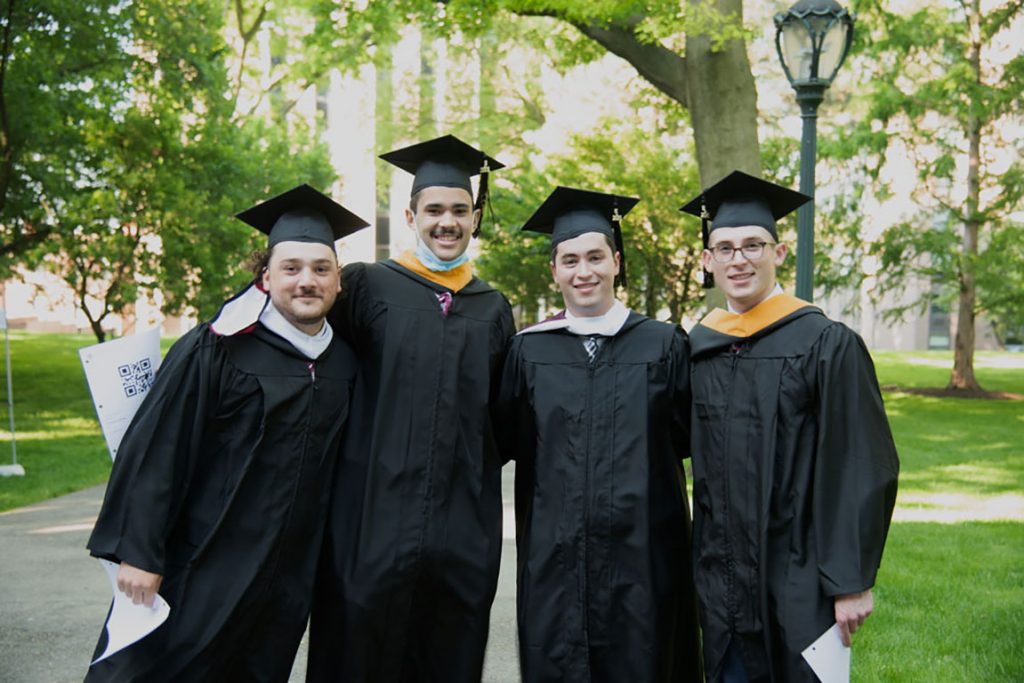
Camaraderie, teamwork, and friendship were the things that helped graduating Fordham College of Rose Hill students Charlie White, Nick Ulto, Tom Hurst, and Joey Randazzo get through the last 14 months. The men, who were all a part of Fordham’s rugby team, said that it was good to know they had support.
“It was pretty challenging, but we all have each other,” White said. “We all rallied around each other as a group of guys playing a sport, so we really all had each other’s back.”
White said that this was a theme for the team, even before the pandemic.
“We would always go out on the weekend and try to plan social events and we were just trying to include everyone; that’s the best part about [rugby],” he said.
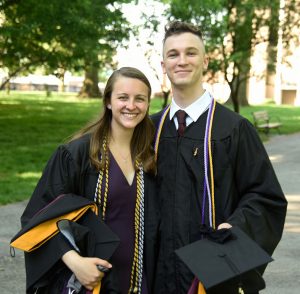
During his first year on campus, James Langan, FCRH ’21, started an intramural soccer team.
“A couple of kids in my dorm, kids in my classes, kids I met in the cafeteria—it was a good way to connect those first few weeks,” he said.
Some of those friendships and connections from that team lasted all four years, including one with Saige Mitchell, also FCRH ’21.
For Mitchell and Langan, reuniting on the Rose Hill campus for their diploma ceremony was the first time they had seen each other and their friends in person in over a year.
“I’m really grateful that we’re able to be here, said Mitchell, who’d been taking all of her classes virtually.
Both said that their classes at Fordham helped prepare them for the future.
Mitchell, who will be starting medical school at Duke University, said that her biochemistry class had the most impact.
“I’m a biology major and I took it through the chemistry department. I met a really great mentor, and I’ve been doing research with her for about a year and a half,” she said.
For Langan, who is applying to graduate school, his upper-level numerical analysis class encouraged him to study math in depth.
“It was fascinating to learn what was out there beyond the normal level of math that I’ve learned my whole life,” he said.
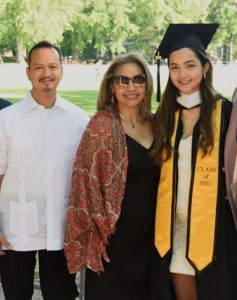
Being back on the Keating steps reminded Lucianne Magnibas, FCRH ’21, of her favorite Fordham memory: the annual candle-lighting ceremony for first-year students.
“As an orientation leader, I got to experience that over and over again and it’s always really touching,” she said.
Magnibas, a commuter student who majored in international political economy, said that she was grateful to be back on campus after the last year.
“These past couple of weeks, being on campus and then of course graduating on Keating brings me back to why I love it here so much,” she said.
Her father, Edwin Maginbas said he was so proud of all his daughter has done so far.
“She’s accomplished a great deal here,” he said. “We’re so happy with the University and the school. She has a great school spirit and participates even as a commuter she’s very involved. We’re just ecstatic, very proud parents.”
Jade Kennedy Chrichlow, FCRH ’21, was an African and African American Studies major and peace and justice minor. She’ll be starting Fordham Law in the fall.
“My intro to Peace and Justice class with Professor Garnet Kindervater was really amazing. I used that class for my personal essays for law school, and it really just transformed how I thought about peace and justice because what’s justice for one person may not be justice for another person,” said Chrichlow, who was a transfer student to Fordham. “I find that even in my thesis I cited things from that class. I constantly see myself going back to that class and telling everyone about it.”
Alyssa Grimando, GABELLI ’21, came from East Northport, New York, to pursue a global business degree on the Lincoln Center campus, with a minor in sustainable business. She’ll soon be starting a job with Bank of America. Her favorite Fordham memory is studying abroad at Fordham London. Graduating in person was a special day for her, she said.
“It’s been a long time coming, and a lot of hard work, and I’m glad we’re being recognized for it.”
Tyler Raciti, FCRH ’21, said graduation is “a special moment” for him. When I came to Fordham, it was in the backdrop of my father passing away. Being here, I feel like he’s with me.”
Raciti was instrumental in organizing Fordham’s Lavender Graduation for LGBTQ students.
“I’m so happy that Fordham was really embracing diversity and inclusion,” he said, citing that ceremony and other Diversity Graduation Celebrations.
He was also the founding editor of the Fordham Undergraduate Law Review. “Great minds,” he said of his fellow students. “I’m going to miss them.”
Shaniqua Orr, GSS ’21, said she had to push herself to finish her Master’s in Social Work, and that it’s because of her faith that she did. “I was raised in foster care, but I maintained my relationship with my mom and dad, who both passed away this past year,” said Orr, who served as student speaker at the Graduate School of Social Service’s virtual ceremony. “I feel like I can identify with my patients because I’m able to tap into their feelings. Social work is not for the faint of heart. It’s all about delivery: What you say and how you say it. Like my mom used to say, ‘You can get more bees with honey than vinegar.’ But it’s mostly about being transparent and leaving your opinions outside the door.”
Ray Mitchell, GSAS ’21, was no stranger to Fordham when he set foot on the Rose Hill campus in 2017. The Edmonton, Canada, native spent a month at the University in 2016 when he earned an international diploma in humanitarian assistance from Fordham’s Institute of International Humanitarian Affairs.
He was so impressed, he signed on to earn a master of arts in international humanitarian action, which is jointly offered with the Graduate School of Arts and Sciences. On Saturday, Mitchell, who currently works for a company contracted by NATO to supervise the removal of landmines in Afghanistan, Iraq, Mali, Ukraine, and Kosovo, was one 136 students to receive their diplomas at a virtual ceremony following the University’s main commencement.
He said he was humbled to work with IIHA faculty such as humanitarian programs director Larry Hollingsworth, and senior fellow Anthony Land. He wrote his master’s thesis about private medical support for humanitarian missions and said he’ll apply the lessons he learned to his current work.
“The way that I do operational planning and the way that I do strategic management has forever changed because of this program. I’ll focus on sustainability and localization at the national level from the very start of mission planning,” he said.
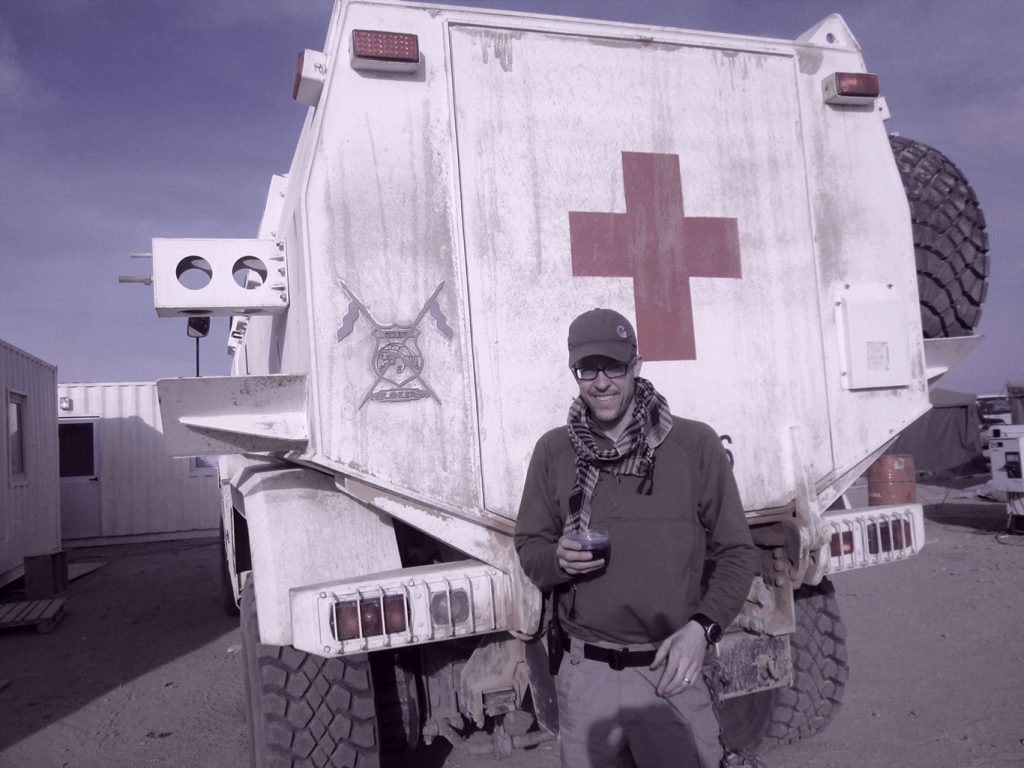
— Reporting by Kelly Kultys, Adam Kaufman, Sierra McCleary-Harris, and Patrick Verel
]]>
During her senior year in high school, Slattery, FCRH ’15, attended a Model United Nations conference in Hershey, Pennsylvania, that featured a keynote speaker from Honduras. When he announced he’d be giving away a free trip to the Central American nation, Slattery, who had been planning to enlist with U.S. Navy after graduation, was shocked to hear that out of 3,000 names in the audience, hers was the one that was chosen.
“My parents were initially very excited, not so much when they found out it was the then-murder capital of the world,” she said.
“After being exposed to extreme poverty there for the first time, it just changed my path in life.”
That service trip, to work with the group Students Helping Honduras, only lasted a week, but it inspired Slattery to pursue a career in humanitarian aid. After graduating from Fordham College at Rose Hill with a degree in political science, she moved to Indonesia to teach English on a Fulbright scholarship, and then returned to Honduras in 2016 to work as a program director for Students Helping Honduras.
That experience brought her back to Fordham, where she’ll be earning an M.S. in humanitarian studies in May.
“I came back and said ‘I really wanted to put my feet into this work further and work in humanitarian response,’” she said.
Education is Key
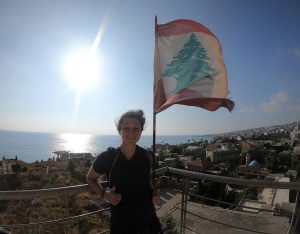
Education is key to the work that Slattery did in Honduras, and it’s going to be the focus of her master’s thesis. She conducted needs assessments as a member of a Honduran-led team in the northern section of the country.
The assessment identified difficulties such as schools that were five miles away from where children lived, schools that were situated close to dangerous locations like highways, and in more than one occasion, schools that shared space with local bars.
While it’s well understood that children can suffer severe development issues when their education is denied or delayed, what Slattery has found is that when it comes to children, safe environments and education can mutually reinforce each other. And, conversely, missing out on an education can be nearly as damaging—for the child and the community—as the disaster that disrupted it.
“Once a child falls out of the system, they may not feel empowered to participate in community programs or civil society. It proves costly for everyone, because the thinking, learning, and psychosocial skills that children develop in school contribute to post-war reconstruction,” she said.
“Education should be considered a pillar of the humanitarian response. We give lifesaving things the most priority, like food, water, and shelter, but we’re finding that education is just as important.”
Studying Humanitarian Action in Spain
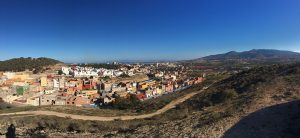
This past spring, Slattery attended the Universidad de Deusto in Bilbao, Spain, and took classes such as Humanitarian Action and Peacebuilding, Design Strategies and Protection Programs in Humanitarian Action, and Ethical Management of Humanitarian Organizations. Like Fordham, Universidad de Deusto is a member of the Network on Humanitarian Action (NOHA). Slattery said her experiences in Honduras convinced her she wanted to focus on community-based protection, which made Deusto an ideal place to take classes.
“In Deusto, they focus on a specialization of protection. People are often viewed as objects in need of protection, but they have their own resiliency to protect themselves. These classes really focused on mainstreaming protection programming into all aspects of humanitarian programming,” she said.
What was particularly enlightening about her time in Spain, she said, was the way she was able to observe the externalization of the European Union’s border. In April, she flew to Morocco and visited Melilla, a five-square mile autonomous Spanish city of 78,000 residents located on the tip of the country’s northern coast. The city is separated from the rest of the African continent by a set of 20-foot-high fences topped with razor wire. As part of their visit, Slattery’s class met with a nonprofit organization that helps immigrants that successfully make it over the border apply for asylum.
“I’ve traveled to probably 40 countries, and it was probably one of the most intense borders I’ve ever seen,” she said.
In addition to academic work, Slattery has in the last year earned certificates in areas such as hazardous materials, bleeding control, and tactical emergency casualty care. Her travels in Honduras often brought her to remote areas where medical care was in short supply, so she said she felt the need to get basic training for herself to prepare her future work.
A Trip She’ll Never Forget
Looking back, she said that what moved her the most when she first visited Honduras was a stop at a village that had been devastated by Hurricane Mitch in 1998. In 2010, she said, many residents still hadn’t returned home and had little access to clean water, electricity, or education.
“This forgotten, protracted displacement really stuck with me, and it just made me realize that we have a shared responsibility to bear witness, stand in solidarity, and preserve the human dignity of those affected by violent conflicts or climate disasters,” she said.
]]>President Michael D. Higgins will speak as part of Fordham’s Humanitarian Lecture Series
New York, New York, Sept. 17—Fordham University will host Michael D. Higgins, president of Ireland, on Monday, Sept. 30. He will speak at the Lincoln Center campus at 11 a.m.
President Higgins, who has campaigned for human rights, peace, democracy, equality, and justice throughout his years as a political leader, will deliver a talk on “Humanitarianism and the Public Intellectual in Times of Crisis” as part of the Ireland at Fordham Humanitarian Lecture Series, a partnership between the Permanent Mission of Ireland to the United Nations and Fordham’s Institute of International Humanitarian Affairs.
In his address, President Higgins is expected to focus on the impact of migration on Ireland and the United States, and the importance of adequate support in present circumstances for people forced to flee their homes as a result of poverty, conflict, or climate change.
“Fordham is honored to host President Higgins, and to have him speak to the University community,” said Joseph M. McShane, S.J., president of Fordham. “He is an eloquent, compassionate, and thoughtful leader, and his commitment to serve the most vulnerable among us makes him an especially fitting choice to deliver this humanitarian lecture.”
Brendan Cahill, executive director of the Institute of International Humanitarian Affairs, added, “At a time when world politics has become defined by how nations undermine international agreements, it is a great honor to welcome a leader who celebrates multilateralism, who speaks clearly about not only the Irish history of hunger, migration, and violence but its contribution to peace, to education, to an ethical and humanitarian approach to world issues.”
Michael D. Higgins has served as the president of Ireland since November 2011. A passionate political voice, poet and writer, academic and statesman, human rights advocate, promoter of inclusive citizenship, and champion of creativity within Irish society, President Higgins has previously served at almost every level of public life in Ireland, including as Ireland’s first minister for arts, culture and the Gaeltacht.
Born in Limerick City and raised in County Clare, he was a factory worker and a clerk before becoming the first in his family to access higher education. He studied at University College Galway, the University of Manchester, and Indiana University. As a writer and poet, he has contributed to many books covering diverse aspects of Irish politics, sociology, history, and culture.
President Higgins was the president of the Labour Party from 2003 until 2011, when he resigned following his election as president of Ireland.
The Ireland at Fordham Humanitarian Lecture Series, a multiyear partnership between the Permanent Mission of Ireland to the United Nations and Fordham’s Institute of International Humanitarian Affairs (IIHA), explores the challenges facing policymakers and humanitarians as they seek to ensure aid reaches those in need, that humanitarian principles are upheld, and that civilians are protected. Specific topics of discussion include humanitarian protection through international humanitarian law, humanitarian financing, climate and security. The inaugural lecture at the United Nations Headquarters in New York on April 29th by former President, H.E. Mary Robinson, Chair of the Elders. The series will run until June 2020 with events in New York, Dublin, and Geneva.
About Fordham University
Founded in 1841, Fordham is the Jesuit University of New York, offering exceptional education distinguished by the Jesuit tradition across nine schools. Fordham awards baccalaureate, graduate, and professional degrees to approximately 15,000 students from Fordham College at Rose Hill, Fordham College at Lincoln Center, the Gabelli School of Business (undergraduate and graduate), the School of Professional and Continuing Studies, the Graduate Schools of Arts and Sciences, Education, Religion and Religious Education, and Social Service, and the School of Law. The University has residential campuses in the Bronx and Manhattan, a campus in West Harrison, N.Y., the Louis Calder Center Biological Field Station in Armonk, N.Y., and the London Centre in the United Kingdom.
Contact:
Gina Vergel
[email protected]
(646) 579-9957
But Ubuntu, a joint program between Fordham, the University of Pretoria, and the Jesuit Institute of South Africa has shrunk that divide over the last six years. Recently, the program has been reimagined and restructured.
“Like all programs, it’s evolved. I have worked closely with our partners in South Africa and with others at Fordham to make sure the experience is an authentic and powerful one for our students,” said Maura Mast, Ph.D., dean of Fordham College at Rose Hill.
“I also want to ensure that the communities with whom we engage have a positive experience.”
Learning By Being With Others
Last spring, the 10 students who lived in South Africa from January to June had their experience shaped by the renewed emphasis on the Ignatian principles that shape Fordham’s mission.
“We want to educate our students for social justice, for well-educated solidarity, for understanding how to be men and women for and with others. You get that by being with others, being in their homes, walking down the dirt roads with them, talking to them, and accompanying them,” Mast said.
“That’s how you develop solidarity, and begin to see God in all people, by first seeing them as humans, in their suffering and their joys.”
In addition to taking classes at the University of Pretoria, Ubuntu students participate in community projects. The emphasis on learning with and from the community is part of the program retooling, as are guided reflections with staff from the Jesuit Institute of South Africa.
Ubuntu director Booi Themeli, Ph.D., a lecturer in economics, said the program changes are meant to help students better understand that they’re not just tourists.
“They understand that the program is about them growing up as students at a Jesuit school, and seeing themselves as partners with communities,” he said.
Themeli interviewed each student before their departure, and he said this year’s cohort was phenomenal, in no small measure because two members were humanitarian studies majors, a degree offered in tandem with the Institute of International Humanitarian Affairs.
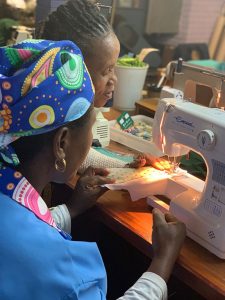
An Intense Focus on Community Projects
Emma Wilhoit, a rising junior at Fordham College at Rose Hill and a native of Shawnee, Kansas, was one of them. She worked with the social and training services organization Kamcare. Her initial goal was to introduce and distribute reusable sanitary pads to women living in an informal settlement (similar to a shantytown) on the outskirts of Pretoria. That evolved into something much better. Soon, instead of buying the sanitary pads, Wilhoit collaborated with the women so that they could design, sew, and sell the pads themselves.
“The women were ready, willing, and able to respond to my project. All I had to bring were the ideas and the resources, and from there they completely took it into their own hands,” she said.
“Now women in the community have employment and are paid a living wage to produce pads, which are given out through the program.”
Joergen Ostensen, a native of Hope, Maine, and fellow rising junior who is majoring in communications, said he considered Ubuntu key to his career.
“In order to be a journalist and someone who’s able to participate in meaningful discourse in the world, I feel like you need to understand the realities that people face in other parts of the world,” he said.
Ostensen tutored a class of third-grade students in reading for his service project. At the end of the year, he gave each of the 25 students a book he’d written that was inspired by the wildlife safari the Ubuntu class had gone on. He said he hoped the book would encourage reading and expand the students’ worlds a little.
“One of the tragedies of Apartheid was that it was illegal for black people to leave the area they were assigned to, so they couldn’t even go on a safari in the country they live in,” he said.
“It’s not illegal anymore, but if you live in a township and make minimum wage, which is like $1.50 an hour, or you’re unemployed, which is 40 percent of the population, it doesn’t really matter. They’re not really allowed to move around, because they don’t have the financial resources.”
Pausing to Reflect
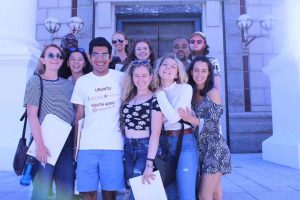
Wilhoit and Ostensen both felt they benefited enormously from the guided reflections in the program, which is offered in association with the Desmond and Leah Tutu Legacy Foundation.
“Poverty in Africa is very different from anything a student might experience in America. We saw it first hand in ways that could be hard to handle and hard to process. Reflection was useful because we were able to unload it and unpack it and realize how to handle it in the future,” Wilhoit said.
“The village where we lived was really nice, so it was quite a jarring sight to go from our service sites back to the village. It really brought up questions, like, ‘Why am I here and they’re there?’”
Ostensen recalled a few instances that he said were difficult. During a workshop, a fellow student was asked in earnest by a local woman what she should do in a situation where she needed to use her body to get a promotion.
“That was a real conversation she had with someone. I mean, what would you do? Together we could figure out what to say, or just cope with the fact that people are living in a world like that,” he said.
Equally as profound, said Wilhoit, was the intense bond the students formed with each other.
“When we were there, we were all living in the same place, going to the same classes, going on the same trips,” she said, noting that the spirit of Ubuntu can be expressed as “I am because we are.”
“Each one of us is who we are because of the way that the group is. I think I’m going to miss them and being constantly surrounded by these people and experiencing the bond in that way.”
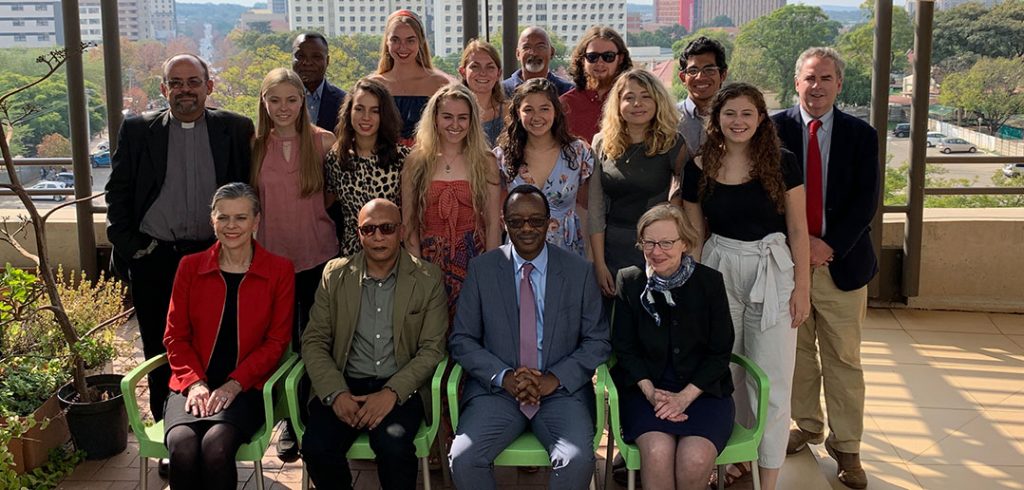
Applications for the spring program are due by October 1.
]]>The ceremony, held on June 28 at the Lincoln Center campus, honored the 54th graduating class of Fordham’s International Diploma in Humanitarian Assistance (IDHA), an intensive four-week training program geared toward mid-career professionals in the humanitarian aid sector.
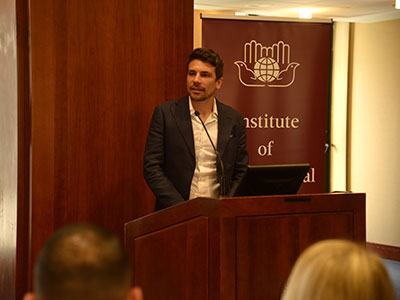
In addition to 22 IDHA graduates, two graduates of the Master of Arts in International Humanitarian Action program, a joint degree offered by the International Institute of Humanitarian Affairs and the Graduate School of Arts and Sciences, were lauded.
On his last day as Fordham’s vice president for administration, Thomas A. Dunne was also honored for his ongoing work with Fordham Law Schools’ Dilly Pro Bono Project, which assists immigrants seeking asylum at the southern border.
In his address, Joseph M. McShane, S.J., president of Fordham, made a point of telling graduates that he schedules his annual year-end retreat so he can attend the ceremony.
“You are built very different. You respond not so much to things and situations as to people. You champion the human dignity of those who live at the edge of human society and the shadowy places of the world,” he said.
“You should really be hailed as masters of compassion, doctors of the human form. That is who you aspire to be, and to become ever more fully, as you begin your professional careers in the field. The field is those parts of the world where human dignity is affronted, and the human heart is tested.”
The graduates hailed from 14 countries, including Sudan, Germany, Australia, and Myanmar. They followed the 53rd IDHA class, whose courses took place in Geneva in October and November.
A Tight Camaraderie Forged
Oscar Lindow, a native of Jordan and programme officer at the World Food Programme, delivered the IDHA student address. He marveled at the friendships that he and his fellow graduates quickly established.
“Months ago, most of us had never met. We then confined ourselves to one building, and we’ve been living together, eating together, studying together. We’ve faced problems together; we’ve solved problems together. … That ties people together,” he said.
“We’ve helped each other and looked after each other. As much as I appreciated some great lectures on children in armed conflict and humanitarian principles, I would also take away with me those ties that were created with people.”
Fadiya Al-Shmailawi Mahadi, a classmate and native of Iraq who works in logistics for the International Committee of the Red Cross, echoed Lindow’s thoughts.
“When you do logistics, you sit in an office, you get orders, and you have to sort them out, so you’re not really into the action. You don’t see things. But when I came here, I listened to what other people are doing, even other students,” she said.
“The stories they told, like when they had to face something in the field, like terrorism, were heartbreaking. But I’m glad I got to know these stories.”
Enormous Challenges Ahead
In his farewell speech, IDHA course director Mark Little, M.D., did not sugarcoat the challenges the graduates face. According to a June 19 report from the United Nations, he noted, 70.8 million people around the world were displaced at the end of 2018.
“The numbers are staggering. When I sat in your seats in 2009, it was less than 30 million people who were displaced,” he said.
He noted that more than 800,000 cases of cholera occurred in three months in 2017 in Yemen; hospitals have been bombed in Syria; and the need for shelter, food, water, and sanitation has grown every year. This makes it even more important to remember the image of a displaced one of the first things students encountered when they were welcome to campus on June 2.
“We’ve heard that the world is losing compassion. I want you to remember the future of that child. As a child of that age, I was displaced by a natural disaster. I remember the fear of water swirling around my classroom,” he said, noting that his family moved to Australia in 1968 as a direct result of flood damage done to his home in Surrey, England.
“Standing on a desk, I remember the fear of the water rising and the policeman coming in, waist deep, and the fear in his eyes. I remember my anxiety being held in a police cell, not knowing anyone. And I remember the kindness of people who cared for me until I returned to my family.”
A Calling of the Highest Order
For reasons that are known to God alone, Father McShane said, these graduates’ hearts are attuned to the longing for creating the world spoken of in the Bible’s Book of Revelations 21:4.
“Then, I saw a new heaven and a new earth. For the first heaven and first earth had passed away. There shall be no more mourning, nor crying out, nor pain, for the former things have passed away,” he said, referencing the scripture. “My friends, this is the vision for your lives. This is the vision to which you will give yourselves to from now until the day you are dead.
“Use your gifts and your mastery of the art of compassion to bring about the realization of this sacred, noble, and divine vision. Glory in being different from others, and realize the dream of a more just society, in which every tear will be wiped away and every heart will sing.”
]]>
